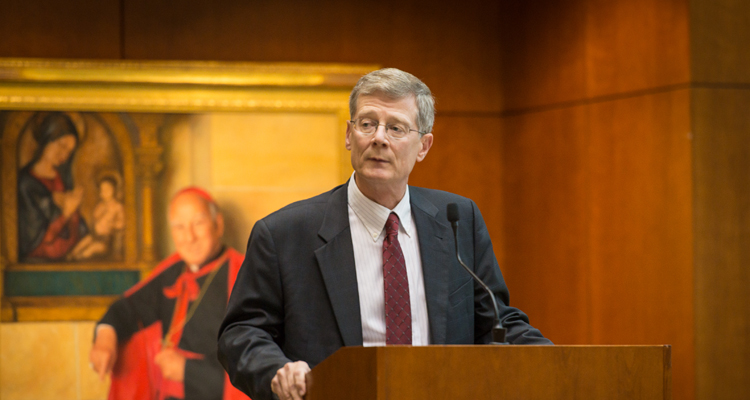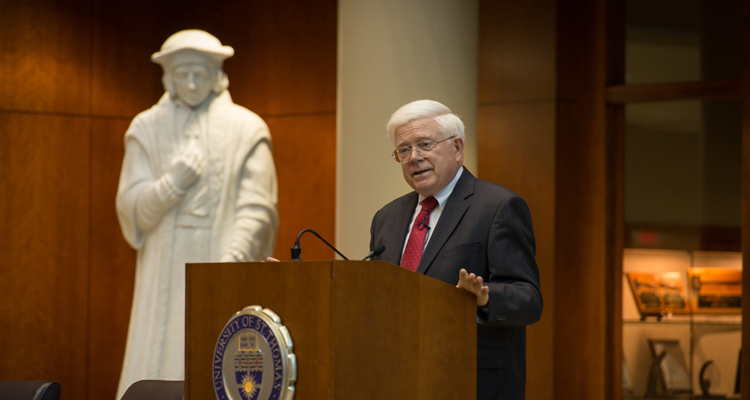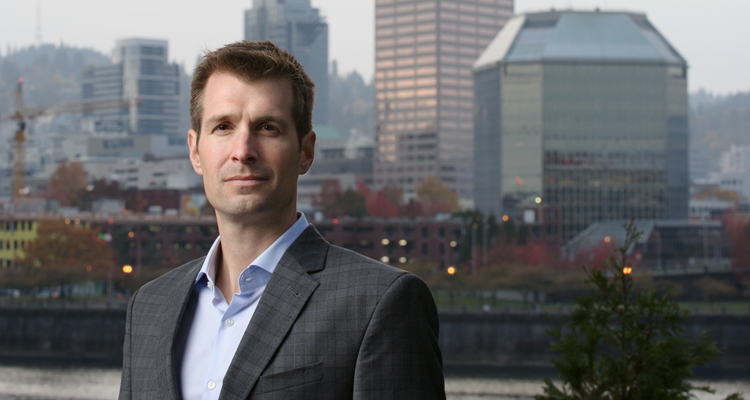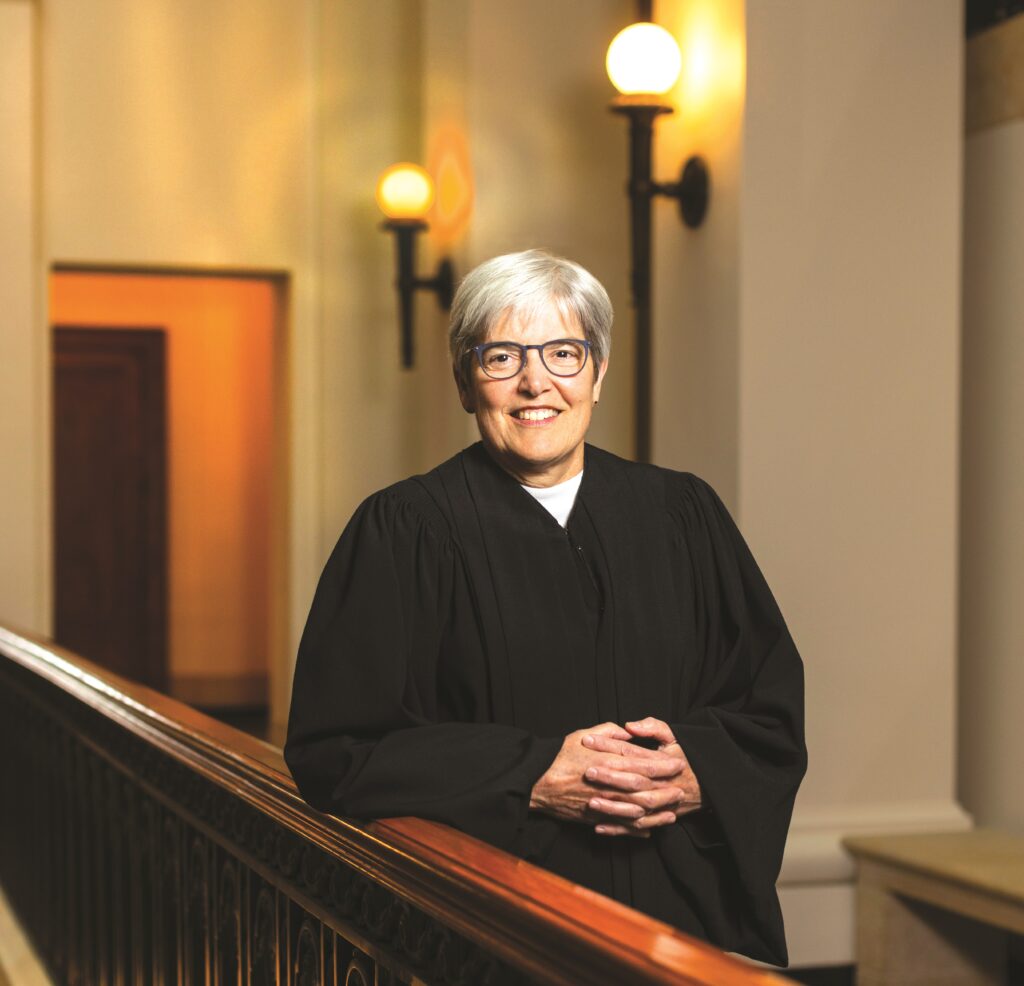Richard Nixon, Rod Blagojevich, Anthony Weiner, Scooter Libby, Martha Stewart, Bill Clinton. We all can name a politician or leader who has acted unethically. Each is evidence that one misstep can snowball into a legal problem if ignored, concealed or committed again. Despite all these cautionary tales, why don’t leaders know how to avoid stepping over the line? After all, once over the line, history shows it’s difficult to get back on course.
In the early fall of 2015, the University of St. Thomas School of Law hosted the 2015 Upper Midwest Ethics and Leadership Summit – one of the first of its kind in the nation aimed at addressing these issues. State legislators from seven states gathered to hear a former Speaker of the House and a staffer who had made mistakes, as well as those who prosecuted and defended such people, talk about ethical dilemmas and strategies for avoiding pitfalls. The summit was presented by the State Legislative Leaders Foundation and the University of St. Thomas School of Law’s Holloran Center for Ethical Leadership in the Professions.
While the September session was directed at political and government leaders, experts say the issues and lessons discussed are equally valuable to anyone who might face an ethical dilemma – lawyers included.
No one is invulnerable
Hank Shea spent two decades as an assistant U.S. attorney prosecuting hundreds of white-collar offenders, including bankers, lawyers, government officials, business owners and executives. As a distinguished senior fellow at the University of St. Thomas School of Law and a fellow at its Thomas E. Holloran Center for Ethical Leadership in the Professions since 2006, Shea has given hundreds of ethics presentations in the classroom and across the country with more than two dozen offenders, many of whom he prosecuted. The offenders describe the often unspoken causes of misconduct and the realities of criminal punishment. This crime prevention through education, as Shea calls it, conveys how to avoid ethical misconduct.
One of the lessons Shea has learned in the process is that no one is invulnerable to temptation or weakness, or immune from bad decisions and improper behavior.
“It can happen anywhere and to almost anyone,” Shea said. “Most of the white-collar offenders who I prosecuted did not wake up the day of their offense and say, ‘Today is the day I risk everything. I risk my liberty, my reputation, my family’s well-being.’” Shea spoke on “How and Why Elected Officials Get Prosecuted” at the Ethics and Leadership Summit.
Also at the summit, former offender Richard Juliano recounted his missteps as he sat next to U.S. District Court Judge Rebecca Pallmeyer, who had sentenced him. It was the first time the two had met face to face since Juliano’s sentencing nine years earlier in her Chicago courtroom.
As a 20-year-old college student in 1987, Juliano began volunteering for Scott Fawell, an experienced cam- paign operative from a prominent political family in Illinois. Over the next 10-plus years, Fawell became the younger man’s mentor, hiring Juliano to work on three political campaigns for George Ryan, a longtime public official in the state. They helped elect Ryan as Illinois secretary of state twice and then governor in 1998.
The downside to the relationship, as Juliano explained to the audience, was Fawell’s insistence that many of Ryan’s campaign workers misuse official state government resources for political purposes. This included diverting government workers, equipment and office supplies for the benefit of Ryan’s campaigns during those years. “Sometimes there’s a permissible mix between government and politics, but in our case it crossed the line into illegality,” Juliano said.
Eventually, Juliano left Ryan and Fawell’s full-time employ to attend the University of Chicago Law School. However, he maintained ties to their organization and got an urgent invitation to join Ryan’s campaign for governor as Juliano was starting his final year of legal studies.
The offer came with a moral dilemma. Fawell wanted Juliano to serve as Ryan’s deputy campaign manager, but his initial compensation wouldn’t reflect that reality. Ultimately, Juliano agreed to be paid with state funds for more than four months while exclusively doing political work.
“There was a fair amount of rationalization from my standpoint,” Juliano said. “I thought I could cover my classes, help get the campaign up and running, and do whatever government work was necessary, all at the same time. Of course that was not realistic and showed poor judgment on my part.”
Eventually, Juliano and his colleagues migrated to Ryan’s political payroll, their candidate won the 1998 gubernatorial election, and Juliano served two years as the new governor’s deputy chief of staff before leaving for an appointed position at the U.S. Department of Transportation in Washington, D.C., in early 2001.
Even before the 1998 election, however, federal authorities had been investigating allegations of corruption among lower-level Secretary of State employees under Ryan. Over time, their attention focused on the previous Ryan campaigns as well as Fawell’s personal misconduct. They tracked down Juliano in late 2001 and asked for his cooperation in the investigation. As part of an eventual plea agreement, Juliano was charged with one count of mail fraud. He resigned his federal government position, pled guilty and waited more than four years to be sentenced. In the meantime, he provided 10 days of crucial testimony in the two trials that ended with the respective convictions of Fawell and former Gov. Ryan on multiple felonies. Each was sentenced to six-and-a-half years in prison.
Judge Pallmeyer listened quietly to Juliano relate the history of his transgressions and then explained her view of the case. Acknowledging his role in aiding the prosecutions, the judge had sentenced Juliano to four years’ probation, including three months of home detention, 350 hours of community service and a $10,000 fine. At the time, federal sentencing guidelines suggested as much as 24 to 30 months in prison, but Juliano’s plea agreement provided leeway for him to argue for a lesser sentence.
“Because Mr. Juliano cooperated early and testified truthfully in the trials of Fawell and Ryan, I believed
he deserved probation,” she said. But Judge Pallmeyer noted that revelations about public corruption under Ryan and Fawell severely undermined the faith of Illinoisans in their government, a trend that continued with scandals involving Ryan’s successor Rod Blagojevich and other state officials.
Now Juliano works at a national trade association in Washington, D.C. After a years-long process, he was reinstated to the Illinois Bar in 2013. Shea, who has made more than 30 ethics presentations with Juliano across the country, had testified on Juliano’s behalf for re-admission. Shea stressed that redemption, healing and reconciliation are values that he and the School of Law hold dear and strive to put into practice.
In 2015, Juliano also was reinstated to the Bar in D.C. However, in response to an audience question, he noted that his felony conviction remains on the record, as only the president can pardon him.

School of Law professor and former prosecutor Hank Shea spoke on "How and Why Elected Officials Get Prosecuted" at the Midwest Ethics and Leadership Summit. Shea is the distinguished senior fellow at the School of Law and its Thomas E. Holloran Center for Ethical Leadership in the Professions.
The slippery slope
Each bad decision can lead down a slippery slope; a small transgression can lead to more serious misconduct.
“Felons typically say that whether it be embezzlement, tax fraud or corporate offenses, after that first wrongful act, it always gets easier to commit the next wrong and to live with it,” Shea said.
Case in point, as Juliano stated, where he worked, “The wrongdoing went on for years, but started small and got more egregious as it continued.”
Looking back on his experiences, Juliano came up with four aphorisms that he shared with the attendees:
- Take the red flag test: If you’re told that “everyone” is doing it, be on guard. Step back and talk to someone outside your immediate sphere.
- Everything you do may be scrutinized by someone someday, so be prepared to defend your actions.
- If you’re continually confronted by ethical dilemmas, find another job.
- Tell the truth, especially when it’s most difficult. It will give you a second chance.
Minnesota trial lawyer Doug Kelley echoed some of Juliano’s points.
Kelley, who has recovered hundreds of millions of dollars for the victims of the multibillion-dollar Ponzi scheme orchestrated by Tom Petters, said that cases frequently start off as something insignificant and then mushroom out of control.
“Little things really matter,” Kelley said. He eluded to Phonegate, a 1990s scandal in which Minnesota legislators were caught using state-funded toll-free phone access codes for personal calls. An investigation ensued. At the time, he represented the Republican caucus.
“There’s that inside, echo mentality,” Kelley said. “Nobody’s looking at it carefully, and that is what will get you in trouble. Today, computers are the same. Don’t use government computers for any campaign business or personal business.”
Kelley understands the pressures political candidates are under because he ran for governor in 1990.
“‘Everybody’s doing it’ will get you in trouble,” he continued. “If it doesn’t feel right, don’t do it.”
If a misdeed has occurred, social media is there to make sure a lot of people know about it.
“When you’re faced with an ethical choice or dilemma, you should assume that whatever you decide will someday become public,” Shea said.
He described a situation in which a Missouri government attorney had a college professor friend who decided to run for Congress, so the attorney served as an adviser to him. They helped set up an independent expenditure in an effort to promote the goals of his friend’s campaign through independent ads and mailings.
“As too often happens in campaigns,” Shea explained, “there was coordination the week before the election. The independent expenditure got addresses from the campaign staff to do a last mailing to all likely voters.”
The Federal Election Commission received a complaint and started an investigation, at which point the two men decided to cover up what, at that point, was an FEC administrative violation. The college professor friend, who had been defeated, filed a false affidavit with the FEC. They then talked several people into testifying falsely. The FEC decided that there was no violation, and two years went by. Both the attorney and his friend were elected – one to the Missouri House, one to the Missouri Senate. The main person they talked into lying had been wearing a tape recorder, and when he got involved in other criminal matters, a search warrant of his apartment turned up many of his secret tapes, including that tape. The FBI investigated and both men had to resign their elected offices and ended up with federal felony convictions. The attorney was disbarred.
Improving ethical behavior
Ethics expert Kirk Hanson had some suggestions on how to improve the likelihood of ethical behavior of leaders, which he presented at the ninth annual Fredrikson & Byron Law Firm Lecture in honor of John Byron. Hanson is executive director of the Markkula Center for Applied Ethics at Santa Clara University, and John Courtney Murray S.J. University Professor of Social Ethics. (Hanson also conducted a private ethics session with the state legislators who attended the Ethics and Leadership Summit.)
Hanson noted four skills a leader needs to manage ethics effectively:
- Know what the values of the enterprise really are, or define them if they don’t exist.
- Know the issues that they’re facing: the ethics risks, the day-to-day kinds of dilemmas that their sales force faces or that other employees face.
- Know the impacts of bad decisions, as well as the impacts of good decisions, to be able to analyze what constitutes a good ethical choice.
- Have the courage to act. It’s costly sometimes, particularly in the short run, to act ethically. Leaders have to be willing to take that risk, even if it means losing their leadership positions.
He emphasized that individuals and institutions should invest in building character. “Certainly St. Thomas, here, is very dedicated to developing that concept of character formation, both at the undergraduate and graduate levels and law school level,” Hanson said.
In fact, the School of Law supports and encourages students’ integration of their faith and deepest ethical principles into their professional character and identity. By providing, from a faith-based perspective, practical skills and theoretical legal education and mentoring, the law school commits to preparing students to become trusted advisers to their clients. Through its curriculum and experiential learning, the school aims to help each student develop the professional and ethical values that are vital to long-term success in their profession.
The School of Law operates under a set of agreed-upon values that include professional formation, Catholic identity with a strong ecumenical component, service, scholarship, innovation, community and relationships. After students graduate, they work in all walks of life practicing law in the judiciary, in public and community service, in business, and in education – which may or may not operate under a set of established values.
In his work with institutions and corporations, Hanson noticed that many of them had not even defined their values, much less discussed them on a continuing basis. He attributed this to their lack of time for philosophical discussion and the vagueness of the term “ethical values.” However, some corporations have deliberate discussions with their employees about the values of the organization and what those values mean in practice.
He also suggested investing in the culture of a corporation so employees know what to expect and what is expected of them. The creation of a culture is easier when a company is new or if the founder is still at the helm. Over time, though, new leaders take over and the culture needs to be sustained. One way to do that, according to Hanson, is to create systems, such as codes of conduct and audit systems, ethics training, reporting systems and ethics risk analysis.
As examples of successful leaders, Hanson referred to some of the best managers of corporate culture as Howard Schultz from Starbucks and Jim Sinegal, co-founder and former CEO of Costco, who have worked hard to create and sustain culture. He also mentioned Terri Kelly of W.L. Gore, who, although the company founder has died, “has created a set of systems that have enshrined the values of the founder into the culture – procedures that make it impossible to avoid the values that were embodied there in the beginning,” he said.
Hanson had recommendations about how to ensure leaders behave ethically. He stressed that society needs to demand its leaders behave ethically. Individuals need to vote for people who have the kind of values they believe ought to be held by governmental leaders. And people have to be able to affect the laws, rules and principles that regulate the government.
“All of us have to be engaged in that; we have to be the leaders we hope to see,” Hanson said. “Individually, I think we need to control our own self-interested instincts and our own response to pressure. We have to be other-oriented, common-good-oriented, ourselves. And we have to be willing to participate in an ongoing debate over what constitutes good ethical behavior.”
Read more from St. Thomas Lawyer.





